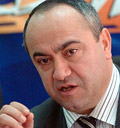– Mr. Badalyan, one of the key directions of the relations of Armenia with EU is the cooperation in the sphere of raising the efficiency of the state management. What programs have you been implementing during the recent years?
– The reforms of the civil service of the Republic of Armenia occupied its stable role in the Armenia-EU program, according to which during 2009-2011 we should be included in the network of similar structures of European states, start and strengthen collaboration with structures of Europe, which regulate relations among civic services, survey the experience of the EU member states in this process in the spheres of management, trainings, attestation, assessment of progress, ethic code and application. We have already registered certain progress in these directions. In particular, we have agreement of cooperation with Bulgaria, Cyprus, Italy and Ukraine. We are negotiating with our counterparts in Ireland in order to start cooperation with them. As a result of close cooperation of the recent years the civil service systems of certain countries were scrutinized, which caused us making certain changes and reforms in the RA civil sector to adjust it to European standards. For this purpose a quite efficient cooperation is launched with the EU programs and specifically with SIGMA. With the latter’s participation and EU’s support we have organized a seminar entitled “Current issues of the RA civil service and incentives of development.” By the end of the last year needs assessment of the civil service sector was conducted by the same program, the results and warranties will be ready in the near future. In the framework of the SIGMA program we are also planning to hold a scientific and practical workshop on the political neutrality of the civil service – from theory to reality. In order to adjust the civil service to European criteria three-month cooperation has been formed with the Armenian office of the British Council, as a result of which a number of trainings were held and other projects are planned as well.
– Today in Armenia in certain circles of state management EU experts are providing consultations. Is their work done in the main direction and can we speak about the results now?
– A quite close and productive cooperation has been set with the EU consultative group, which consists of experienced and well-informed people. The civil service of Armenia and the EU consultative group cooperate in the framework of elaboration and implementation of training programs mostly dedicated to the code of ethics of civil servants, conflict of interests and rules of prevention and theoretic workshops on anti-corruption. With their inclusive support seminars, trainings of trainers were conducted by the AEPLAC. The training includes sessions on prevention of corruption and other topics, the results of which we will bring up shortly.
– In your opinion, will the cooperation with European structures, European experience exchange and investment of certain mechanisms bring tangible results in the efforts of raising the efficiently of the civil service sector of Armenia or in this issue the national peculiarities play a more vital role? And our statesmen often speak about this.
– It is indisputable that national peculiarities have essential importance but this doesn’t mean by speaking or “drumming” about it we should stay apart from the achievements of the mankind. With our cooperation we are trying to take tested solutions from the EU structures and states. If they already have the right solution to this or other matter why would we pick the wrong and more abstruse route? I think that the Armenia-EU cooperation has already given its harvest, the most evident example of which is the presence of the civil service institute in Armenia.

